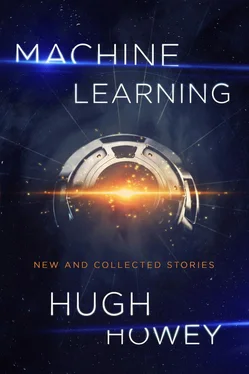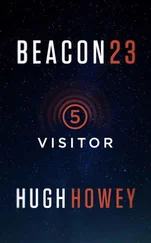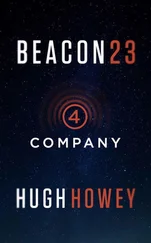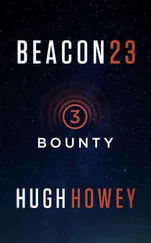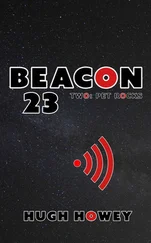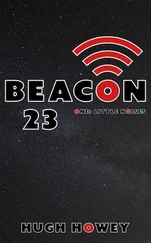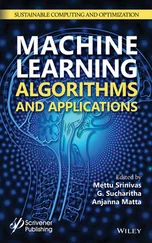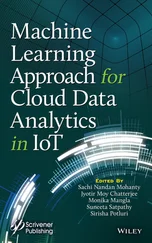The invaders were giving us a choice, it sounded like. All they wanted was half our land and for us to get rid of all of our weapons, and they would leave most of us alone. They gave a date. It was the same one the scientists had already figured. The rock could be moved, they said. It didn’t have to hit. It could go into orbit, and then we could have it for our own.
On a different channel, men with suits and ties argued real loud over how much the rock was worth. They used words I’d never heard of before, something more than “trillion.” I knew what gold and some of the other valuable things were, but some were called rare and sounded like they were from Earth. I couldn’t sort out how something that could kill us one day could be worth so much the next, but the invaders said the rock only needed a nudge.
When I turned thirteen, Pa said I was finally old enough to drive. He taught me in the old pickup with the missing tailgate and the tires that were always starving for air. It was a shifter, which seemed a hard way to start driving, but Pa believed in learning the worst to begin with. I had to yank up on the steering wheel to push the old clutch all the way in. Damn thing made it so my arms would be as sore at night as my legs. Pa cursed every time the gears growled, and it was hot in the truck even with the windows down. But I got to where he would send me to fetch the mail. And once I’d mastered the old pickup, he taught me on the John Deere, and I learned to plow. Pa was right that it made driving the tractor easier. But it was still scary as hell.
The first time you drive something so big, you wonder if one man ought to be able. There was a red lever that went from rabbit to turtle, and Pa would stand in the cabin with me and yell for me to nudge it up. But we were already bouncing around something fierce. The noise was terrible. And looking back, I couldn’t see the house through the haze I was stirring. It weren’t even like we were moving so much as the great big tires of the tractor were spinning the earth beneath their knobby treads. Pa would bend over the seat and knock the red lever up, and the bucking would grow worse. The steering wheel jittered side to side, and I had to clutch it just to stay in my seat.
But like the truck, my fear of the tractor didn’t keep. Before long, Pa hitched the great plow to the back, twenty-four feet wide, and I learned how to kill the soil to make it ready for planting. The seat would bounce me along like I was in a saddle, and the radio would blare in the little cabin that smelled like my dad when he was sweaty. I did circles like I was mowing grass but twenty-four feet at a time. The mesa behind our house would disappear behind the dust, and it got so I couldn’t see the cliffs along the back of the homestead. But I could see the soil in front packed hard and tight, and I could see out the side where I’d already been. Plowing was a lot like mowing—I just had to overlap where I’d been before.
“Not too much overlap,” Pa would tell me. The price of gas had gone way up since First Contact, and too much overlap meant an extra run for no good reason. And so I bounced along and put death in the soil. I cut the worms in half and made things ready for planting. Now and then, a deer would startle across the loose furrows, legs having a hard time of it, and white rabbits would dash from the thrush. The rabbits were the dumbest little things. They would dart back and forth in front of the tractor—they could see me coming, but they couldn’t make up their minds. I would yell and yell at them, but they would just jitter back and forth until the tractor went over them and then the plow. Turning in my seat, I always expected a tuft of white to spit out somewhere, but the soil that kicked up would just turn a little red.
“That’s where the corn would grow the tallest,” Pa would say when I told him how dumb the rabbits were. The blood in the soil was a good thing. That’s when you knew it was ready.
The cliffs behind our house were a source of constant play, and they had a funny name. Too Close for Comfort they were called. I reckoned kids made up that name, but it was a real thing. Scientists called it that. Men who were supposedly smart had come up with it.
When I was a boy too young to drive—before I turned thirteen—they came from the university and dug in the dirt at the base of the cliffs that rise up behind our land. They found so many bones beneath the dirt that they couldn’t take them all. Steve Harkin and I plotted to sneak in one night and nab a skull or two, but the men in the shiny city trucks with no 4×4 put a stop to that by giving us a skull each. It weren’t as fun without the danger and flashlights, but we got our skulls.
I remember cradling that great hunk of bone as heavy as stone and asking one of the university men why they were digging there.
“This here was a buffalo jump,” the man told me. He reminded me of Mrs. Sandy, and he had this clipboard with all kinds of little squares full of numbers and was the smartest man I ever spoke to ’cept for my pa.
“The buffalo used to come over this cliff and smash into the rocks down here,” he told me and Steve Harkin. “That’s where these bones came from.”
Steve thought that was pretty cool. We gazed up at the cliffs that I had known all my life, the ones that delayed the sunrise in the morning, and I saw them different for the first time. I asked this man from the university why buffalo were so dumb.
“Oh, buffalo aren’t dumb,” he claimed. I was about to argue with him, but then he explained. “Indians used to chase the buffalo to the edge of the cliff in great herds,” he said. “They tumbled off hundreds at a time and smashed their legs so they couldn’t walk. While they squealed and snorted and tried to pick themselves up on busted bones, the Indians would run in with spears and jab ’em in the neck.”
Steve whistled. I asked the man if that was real.
“Very real,” he said. “The people who used to live here long before us called it ‘pishkun.’”
“‘Pushkin,’” Steve Harkin said. “What does that mean?”
“It means ‘deep blood kettle,’” the man told us. He pointed to where the men and women were digging in these funny squares with ropes and stakes marking everything off. “You can still see the blood in the soil.”
I didn’t know if that man from the university was playing with us or not, but I told him we needed to go. That skull he’d given me was getting heavier and heavier the longer he talked.
The people on TV with the little flags and the headphones reminded me of white rabbits in the plow season. You could watch ’em go back and forth on the screen. Everyone wanted the gold and the trillions and trillions and trillions and all the rare Earth stuff. But nobody wanted to give up their land. And the invaders insisted on half. They wanted half or they would take it all.
People on the TV argued about why the aliens would do something like this, why they would let the rock hit us and kick up the dirt and make things cold, but I knew. I reckon I knew better than most. Just the year before, I’d watched a movie about invaders coming down. They’d made a different kind of contact. There were fights with lasers and explosions, and our side found a way at the end to lick them for good.
It was a good movie, but those invaders were dumb. I tried to picture us Samuels taming our plot of land something like that. Pa and Riley and me would take to the soil with guns and shoot the worms one by one. And the worms would fight back with the rabbits, the deer, the turtles, and the foxes. And I could imagine them swarming us and licking us good. They were dumb, but there was an awful lot of them.
Which was why we used the plow. It was why we throw the dirt up into the air. We make all things die in the soil so when we put in our own seed, that’s all the life there is. And where the ground is reddest, that deep blood kettle, the corn reaches up so high, you think it might leave us behind. And that’s what the rock will do, plow us under. It weren’t going to be like that movie at all.
Читать дальше
